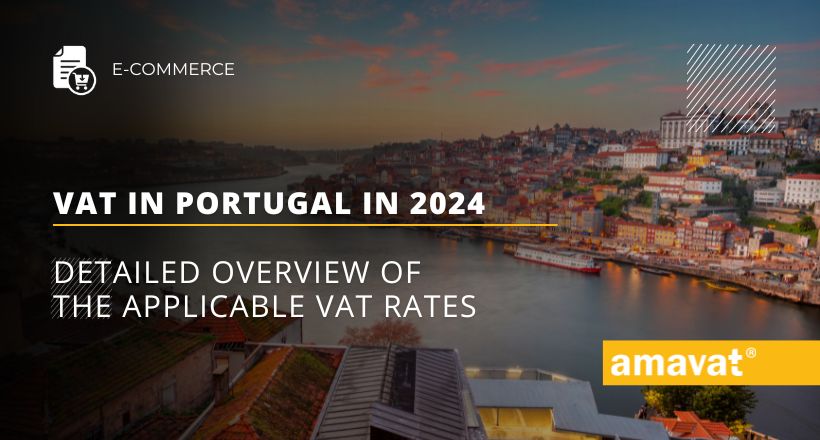VAT in Portugal in 2024
The Value Added Tax (VAT) is a key component of the tax system in Portugal. As a member of the European Union, Portugal adheres to common VAT rules while also implementing its own rates and regulations tailored to the specific needs of the national economy. In 2024, the Portuguese VAT system features three main rates: the standard rate, the first reduced rate, and the second reduced rate, covering a wide range of goods and services. Additionally, Portugal’s autonomous regions, such as Madeira and the Azores, have their own distinct VAT rates. This article provides a detailed overview of the applicable VAT rates, VAT registration rules for businesses, and the procedures for filing tax returns.
VAT Rates in Portugal
Portugal has three main VAT rates:
- Standard VAT rate: 23%
- First reduced VAT rate: 13%
- Second reduced VAT rate: 6%
Standard VAT Rate of 23%
The standard VAT rate of 23% applies to most goods and services that are not covered by the reduced rates.
First reduced VAT rate of 13%
The first reduced VAT rate of 13% applies to selected categories of products and services, such as:
• Certain food items
• Mineral water
• Wine
• Catering and restaurant services
• Selected agricultural products, such as diesel fuel
• Tickets to selected cultural events
Second reduced VAT rate of 6%
The lowest VAT rate, at 6%, covers a wide range of goods and services, including:
- Selected food items
- Certain pharmaceutical products
- Selected medical and dental services
- Medical equipment and devices for the disabled
- Books (both printed and electronic) and newspapers
- Passenger transport services
- Hotel services
- Home care services
- Water supply
- Social housing
- Certain works of art, collectibles, and antiques
VAT in Madeira and the Azores
Portugal’s autonomous regions, Madeira and the Azores, apply separate VAT rates.
Madeira:
- Standard VAT rate: 22%
- First reduced VAT rate: 12%
- Second reduced VAT rate: 5%
Azores:
- Standard VAT rate: 16%
- First reduced VAT rate: 9%
- Second reduced VAT rate: 4%
VAT Registration in Portugal
Businesses planning to sell goods and provide services in Portugal, even without a physical presence such as a branch, must register for VAT. This requirement applies to both domestic and foreign companies. VAT registration is necessary when a company conducts sales within Portugal or provides VAT-covered services. Additionally, if the sale of goods to other EU countries exceeds €10,000 annually, the business must register for VAT and remit the tax in the country of the purchaser or utilize the VAT OSS (One Stop Shop) procedure. The VAT OSS allows for VAT settlement in one country for all EU transactions, simplifying the process for businesses operating in multiple EU markets.
VAT registration in Portugal can be done in two ways: in person at any tax office or online via the Tax and Customs Authority’s website, available at eportugal.gov.pt. The online registration process is particularly convenient for foreign companies, enabling them to complete the formalities without a physical presence in Portugal. The website offers detailed instructions and forms required for VAT registration.
Additionally, businesses storing goods in Portugal are also required to register for VAT. This applies to both traditional warehousing and more complex structures, such as consignment warehouses or Call-Off Stock services.
VAT returns and settlements in Portugal
In Portugal, VAT taxpayers can file VAT returns either monthly or quarterly.
- Monthly VAT returns: Apply to businesses with a turnover equal to or greater than €650,000. The deadline for filing monthly returns is one month and 10 days.
- Quarterly VAT returns: Apply to businesses with a turnover of less than €650,000. The deadline for filing quarterly returns is one month and 15 days.
Additionally, taxpayers are required to submit an annual VAT return by July 15 of the following year.
Intrastat in Portugal
In 2024, the Instituto Nacional de Estatística (INE) decided to raise the Intrastat thresholds, adjusting them to the changing trade and administrative needs of businesses. From January 2024, the new thresholds aim to simplify reporting procedures and better reflect actual goods flows. For imports, the basic threshold is €600,000, with a lower threshold in the Autonomous Region of Madeira set at €25,000. The detailed threshold for imports is €6,500,000. For exports, the thresholds are the same: the basic threshold is also €600,000, and for Madeira, €25,000, while the detailed threshold is set at €6,500,000. These changes aim to relieve smaller businesses from the burden of detailed reporting and better capture larger trade transactions in statistical data.
Tax Authority in Portugal
The Portuguese tax authority is the Autoridade Tributária e Aduaneira. Businesses can contact this authority for VAT and other tax-related matters.
Summary
The Portuguese VAT system in 2024 is diverse and adapted to the specific needs of various economic sectors. The three VAT rates, combined with the distinct rates in Madeira and the Azores, provide flexibility and adequacy in taxation depending on the type of goods and services. VAT registration and regular filing of returns are obligations that businesses operating in the Portuguese market must fulfill. Adhering to these regulations is crucial for proper functioning and avoiding legal issues.





